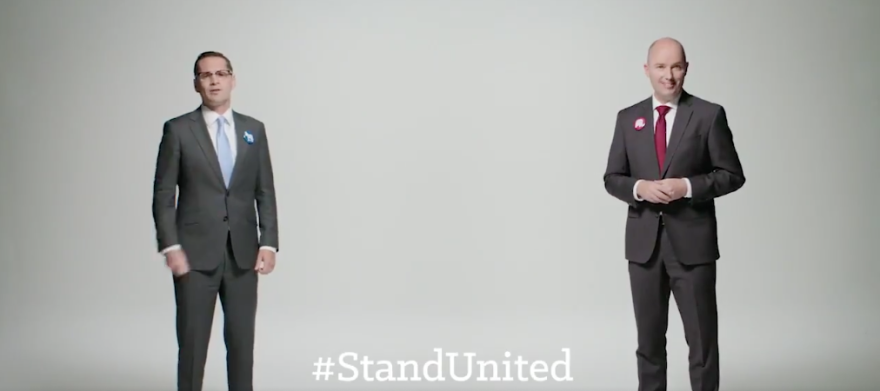Utah politicians like to talk about something called the “Utah way." It’s the idea that things work a little differently here. Emily Means is a politics reporter at KUER and co-host of the podcast State Street, where the latest episode focuses on the “Utah way.” She joined Caroline Ballard to talk about it.
Caroline Ballard: Can you give a quick definition of the “Utah way?” What is this?
EM: The "Utah way" is this idea that politics and policymaking is really nice and polite and collaborative. Utah politicians like to refer to this "Utah way" when they're really proud of something — like when they're talking about the state's economy, for example. Or when they don't like the way something has happened, they'll say this is not the "Utah way" — like something from the federal government that they don't support.
CB: Sort of like that ad from last year's governor election between Spencer Cox and Chris Peterson?
EM: Exactly. Caroline, it's just like that ad. When it came out, it made national news — that these political opponents from two sides of the political spectrum were calling for civility. A lot of people pointed to it as an example of how politics ideally could be.
CB: When you were reporting out this episode, what did you hear from people in Utah about this idea?
EM: Well, we learned the "Utah way" doesn't play out the same for everyone. Natalie Gochnour is the head of the Kem C. Gardner Policy Institute at the University of Utah, and she's been a political insider in the state for three decades. Back in 2010, Natalie worked on something called the Utah Compact. It was Utah's answer to hardline immigration policies that we were seeing nationally. So the Utah Compact brought together faith leaders and business leaders and law enforcement and Democrats and Republicans. They all decided they were going to take a much softer and human approach to immigration. Natalie sees this as an instance of the "Utah way" working really well.
Natalie Gochnour: It's been my experience, Emily, that over time when we have these breakthrough moments, somehow you feel it in the environment. And that's for me code for "the sun comes out."
EM: But that's definitely not everyone's experience.
CB: Who else did you talk to that had a different perspective on this?
EM: Deeda Seed is one person who's had a very different experience from Natalie Gochnour. Deeda works with the Center for Biological Diversity, which is an environmental advocacy organization. A lot of her work centers around opposing Utah's inland port development, which is a big import-export hub that's planned for the northwest part of Salt Lake City, out by the Great Salt Lake. So Deeda is worried about impacts to air quality and wildlife as a result of this development. Deeda says the "Utah way" hasn't been open to her, her colleagues or other activists at all when it comes to the inland port.
Deeda Seed: More often than not, what I see is not the "Utah way." It's the entrenched power interests of the state deciding what they want to do and then going to do it.
CB: These are two pretty different ideas about how it works. Did you find a middle road here for people who have been part of marginalized groups and have still had success in coming together over controversial issues?
EM: Yeah, some people have had that success. We talked to Troy Williams from Equality Utah. Equality Utah advocates for LGBTQ people here in the state. Troy says the way he got a seat at the table is essentially by making friends with Republicans and people in power at the state. And that's something that Troy does get criticized for by other people in the LGBTQ community. But he says it's just the way to get things done.
Troy Williams: It works. We're moving forward. Not that everything's perfect and not that there isn't more work to do. But attacking each other and just criticizing each other on social media. Boy, how brave are you?
EM: But this doesn't mean that Troy is working harder than Deeda for his cause. In Deeda's view, the "Utah way" and these collaborative processes are more likely to happen when there's a clear humanitarian issue at stake — like with the Utah Compact on immigration and with LGBTQ protections. But when there's a lot of money to be made, like in the case of the inland port, Deeda says Utah leaders are less likely to budge on those issues and to welcome people to the table who disagree with them.
CB: So, it's complicated.
EM: As with many things in life, Caroline, it is complicated. And I think Troy Williams put it best when he said the "Utah way" is a lofty aspiration, but when it works, it can lead to some really good outcomes.



